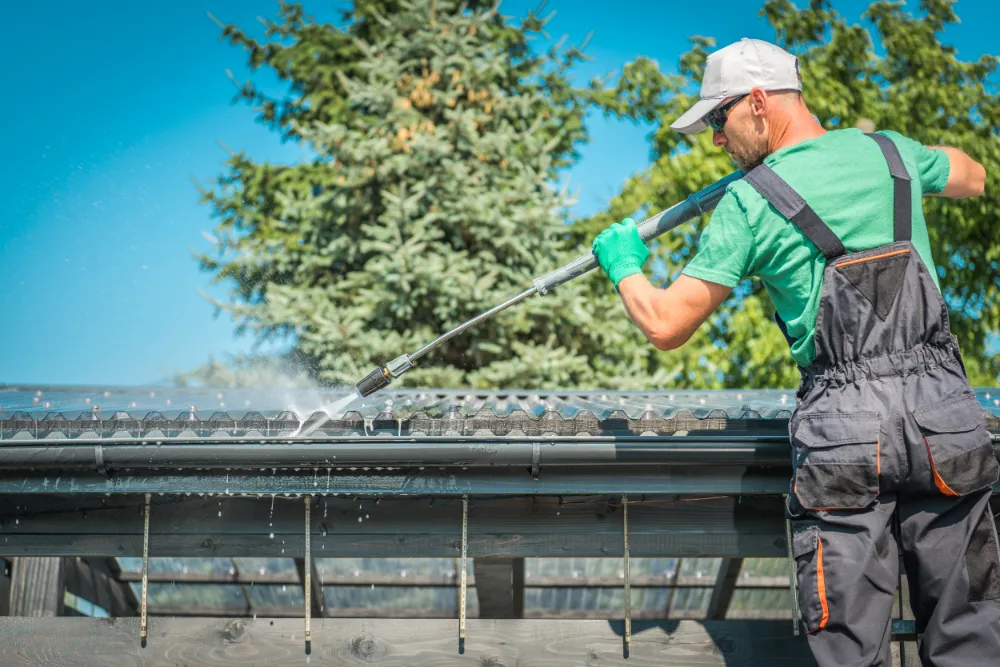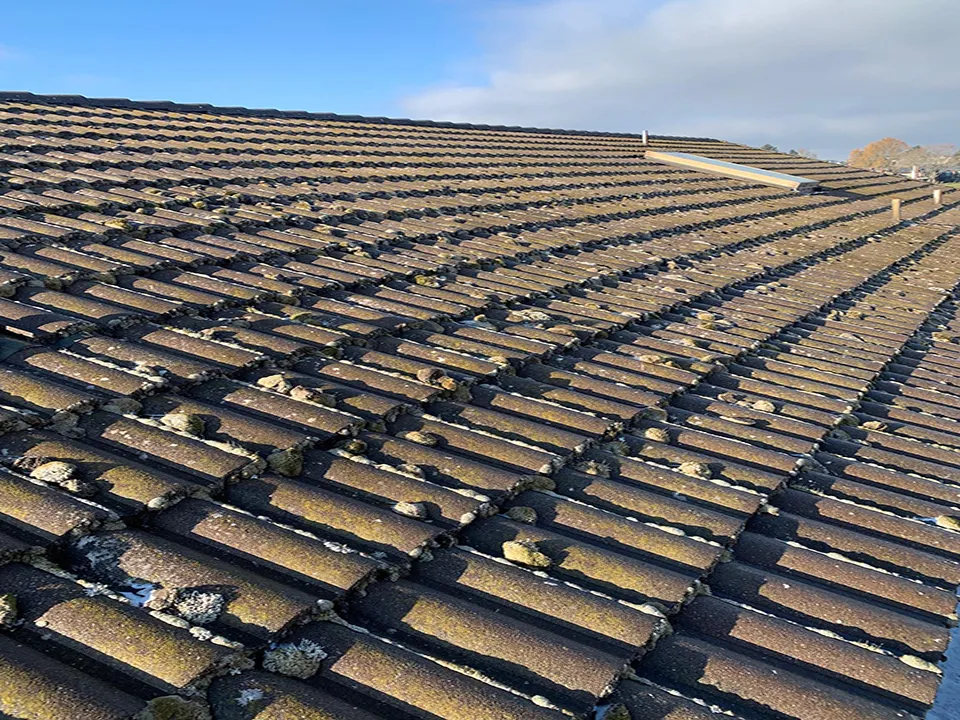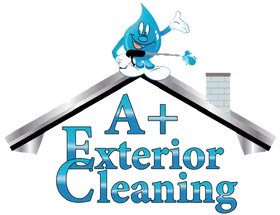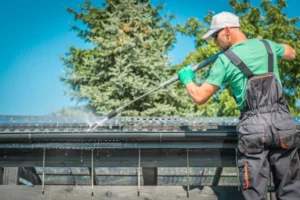Soft Washing vs. Pressure Washing: Which Protects Your Roof Best?
Your roof does more than shelter you from the elements. It’s a significant investment that directly impacts your home’s value, energy efficiency, and overall appeal. But over time, algae, moss, dirt, and debris accumulate, leaving unsightly streaks and potentially compromising the integrity of your roofing materials.
When it comes time to clean, many homeowners face a critical question: Should I use pressure washing or soft washing? The wrong choice can lead to costly damage, while the right approach extends your roof’s lifespan and keeps it looking pristine.
At A+ Exterior Cleaning, we’ve seen firsthand how cleaning methods impact roofs. This guide breaks down the differences between soft washing and pressure washing, helping you understand which option best protects your investment.
Understanding Pressure Washing
Pressure washing uses high-powered water jets to blast away dirt, grime, and organic growth. The force behind these systems can reach anywhere from 1,500 to 4,000 PSI (pounds per square inch), making it highly effective for hard surfaces like concrete driveways, brick walls, and metal siding.
For certain applications, pressure washing delivers fast results. It strips away stubborn buildup quickly and can tackle heavy-duty cleaning jobs with ease. However, when it comes to roofs, that same power becomes a liability.
Roofing materials like asphalt shingles, clay tiles, and wood shakes aren’t designed to withstand such intense force. High-pressure water can dislodge protective granules from shingles, loosen tiles, and drive moisture beneath roofing layers where it doesn’t belong. What seems like a thorough cleaning can actually accelerate wear and create hidden damage that leads to leaks and premature roof failure.

Exploring Soft Washing Techniques
Soft washing takes a completely different approach. Instead of relying on brute force, this method uses low-pressure water combined with specialized cleaning solutions to gently remove contaminants. The pressure typically stays below 500 PSI, making it safe for delicate surfaces.
The cleaning agents used in soft washing are designed to break down organic matter at the molecular level. These biodegradable solutions kill algae, moss, mildew, and bacteria at their roots, preventing regrowth far longer than pressure washing alone. Once the solution has done its work, a gentle rinse washes everything away without disturbing the roofing material.
Soft washing isn’t just gentler—it’s more effective. Because the cleaning agents penetrate deeper than water alone, they eliminate growth beneath the surface, delivering results that last significantly longer. This means fewer cleanings over time and better long-term protection for your roof.
Roof Types and Cleaning Methods
Not all roofs are created equal, and the right cleaning method depends heavily on your roofing material.
Asphalt shingles, the most common roofing type in North America, are particularly vulnerable to pressure washing. The granules on the surface protect against UV rays and weathering. High-pressure water strips these granules away, exposing the underlying material to sun damage and accelerating deterioration. For asphalt roofs, soft washing is the clear winner.
Tile roofs, whether clay or concrete, may seem durable enough for pressure washing, but the grout and underlayment beneath can be damaged by excessive force. Soft washing preserves both the tiles and the critical layers underneath.
Metal roofs can handle slightly more pressure than shingles or tiles, but even here, too much force can damage protective coatings and sealants. A gentler approach extends the life of the finish.
Wood shake and cedar roofs require the most delicate care. Pressure washing splinters fibers, causes premature aging, and creates entry points for moisture. Soft washing cleans thoroughly while maintaining the wood’s integrity.
At A+ Exterior Cleaning, we assess your specific roof type before recommending a cleaning method. Our team understands the unique needs of each material and tailors our approach accordingly.

The Risks of Pressure Washing Your Roof
Using a pressure washer on most roofing materials is a gamble that rarely pays off. While the immediate visual result might seem impressive, the hidden damage can lead to a cascade of expensive problems.
- Granule Loss on Shingles: As mentioned, the protective granules on asphalt shingles are vital. Pressure washing strips them away, which is akin to removing the roof’s sunscreen. This accelerates deterioration and can void your manufacturer’s warranty.
- Water Intrusion: High-pressure water can be forced underneath shingles or tiles, bypassing the carefully designed water-shedding system. This moisture can become trapped in the underlayment and roof deck, leading to wood rot, mold growth inside your attic, and ceiling leaks inside your home.
- Cracked or Broken Tiles and Shingles: The sheer force of the water jet can easily crack, chip, or break roofing materials, especially older tiles or shingles that have become brittle over time. Each broken piece is a potential entry point for water.
- Voided Warranties: Many roofing manufacturers explicitly state that using a pressure washer will void the warranty on their products. If damage occurs, you could be left footing the entire bill for repairs or even a full roof replacement.
- Reduced Roof Lifespan: All these forms of damage combine to significantly shorten the effective life of your roof. A roof that should have lasted 30 years might need replacement in 15 or 20 years due to improper cleaning methods.
The Lasting Benefits of Soft Washing
Soft washing is more than just a gentle cleaning method; it’s a comprehensive roof cleaning that offers superior, longer-lasting results and protects your property.
- Prevents Damage: The low-pressure application ensures that no harm comes to your shingles, tiles, or their protective coatings. It preserves the structural integrity of your roof, which is the primary goal of any maintenance task.
- Kills Growth at the Source: Unlike pressure washing, which only removes the visible top layer of growth, soft washing eliminates algae, moss, and lichen at a biological level. The specialized solutions kill the roots, preventing them from growing back quickly.
- Longer-Lasting Results: Because the organic contaminants are killed, not just sheared off, a soft-washed roof stays clean significantly longer. Homeowners often find their roofs remain free of stains and growth for three to five times longer than after a pressure wash.
- Improves Curb Appeal and Property Value: A clean, well-maintained roof dramatically improves your home’s appearance. The black streaks and green moss that make a roof look old and neglected are completely removed, restoring its original color and boosting curb appeal.
- Safe for Your Property and the Environment: Professional soft washing companies, like A+ Exterior Cleaning, use biodegradable, eco-friendly cleaning solutions. These are applied carefully to protect your landscaping and the surrounding environment while being tough on organic stains.

Cost Analysis: Soft Washing vs. Pressure Washing
On the surface, pressure washing might seem like the more affordable option. It’s fast, widely available, and often marketed as a budget-friendly solution. But when you factor in the potential for damage, the math changes dramatically.
Repairing granule loss, replacing damaged shingles, or fixing water intrusion caused by pressure washing can cost thousands of dollars. In some cases, premature roof replacement becomes necessary—a significant financial burden that far outweighs any initial savings.
Soft washing costs slightly more upfront because of the specialized equipment and cleaning solutions involved. However, it eliminates the risk of damage, extends the time between cleanings, and ultimately protects your investment. When you consider long-term maintenance and repair costs, soft washing is the more economical choice.
A+ Exterior Cleaning offers transparent pricing for both soft washing and pressure washing services. We provide detailed assessments and recommendations based on your roof’s condition and material, ensuring you get the best value for your money.
Protect Your Roof with the Right Cleaning Method
Your roof is one of your home’s most critical components. Choosing the wrong roof cleaning method can lead to premature wear, costly repairs, and reduced curb appeal. Pressure washing might deliver quick results, but soft washing protects your roof while delivering cleaner, longer-lasting outcomes.
For most roofs—especially those with asphalt shingles, tiles, or wood shakes—soft washing is the superior choice. It removes contaminants safely, prevents regrowth, and preserves the materials that keep your home protected.
At A+ Exterior Cleaning, we specialize in soft washing techniques designed to restore and protect your roof. Our experienced team uses the right approach for your specific roofing material, ensuring exceptional results without the risk of damage.
Ready to give your roof the care it deserves? Contact A+ Exterior Cleaning today for a professional roof assessment and cleaning service you can trust.
https://www.google.com/maps?cid=9581861370272832557



